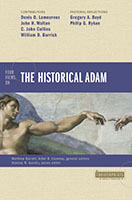About the Editors:
Mathew Barrett (Ph.D., The Southern Baptist Theological Seminary) is Assistant Professor of Christian Studies at California Baptist University as well as the founder and executive editor of Credo Magazine. He is the author of several books, including Salvation by Grace: The Case for Effectual Calling and Regeneration.
Ardel B. Caneday (Ph. D., Trinity Evangelical Divinity School) is Professor of NT and Greek at the University of Northwestern – St. Paul in the Department of Biblical and Theological Studies, where he has taught for more than twenty years. He is the coauthor of The Race Set Before Us: A Biblical Theology of Perservance and Assurance.
About the Contributors
Denis O. Lamoureux (Ph. D., University of St. Michael’s College; Ph. D., DDS, University of Alberta) is Associate Professor of Science and Religion at St. Joseph’s College in the University of Alberta.
John H. Walton (Ph. D. Hebrew Union College) is Professor of OT at Wheaton College Graduate School.
C. John Collins (Ph. D., University of Liverpool) is Professor of OT at Covenant Theological Seminary.
William D. Barrick (Th. D., Grace Theological Seminary) is Professor of OT at the Master’s Seminary.
Gregory A. Boyd (Ph. D., Princeton Theological Seminary) is senior pastor at Woodlands Hills Church in St. Paul, Minnesota.
Philip G. Ryken (Ph. D., University of Oxford) is President of Wheaton College in Wheaton, Illinois, and former senior minister of Tenth Presbyterian Church in Philadelphia.
Overview:
The Four Views on the historical Adam attempts to create a meaningful dialogue between different positions within contemporary evangelicalism concerning the origins debate. Lamoureux defends an evolutionary-creation view, arguing that God accommodated the Hebrew mind and told the creation account from an ancient Near Eastern (ANE) scientific perspective. Walton argues that the account as told in Genesis is not fundamentally about scientific data whether ancient or modern but a story about God’s creation of man identifying functional categories. Thus, he argues that Adam signifies everyman in contrast to the first man. Collins defends a classic old earth creation view. Here, temporal aspects are viewed as non-literal and a part of the accommodation of the ancient’s perspective while essential historicity is yet affirmed. Finally, Barrick affirms the young-earth creation position, taking Genesis as a direct revelation from God that is both historical and factual. A final section provides pastoral reflections on the importance of the question.
Table of Contents:
Introduction: Adam, to be or not to be?
Matthew Barrett and Ardel B. Caneday
- No Historical Adam: Evolutionary Creation View: Denis O. Lamoureux
Response from the Archetypal view
Response from the Old-Earth View
Response from the Young-earth View
A Rejoinder
- A Historical Adam: Archetypal Creation View: John H. Walton
Response from the Evolutionary View
Response from the Old-Earth View
Response from the Young-Earth View
A Rejoinder
- A Historical Adam: Old Earth Creation View: C. John Collins
Response from the Evolutionary View
Response from the Archetypal View
Response from the Old-Earth View
A Rejoinder
- A Historical Adam: Young-Earth Creation View: William D. Barrick
Response from the Evolutionary View
Response from the Archetypal View
Response from the Old-Earth View
A Rejoinder
Pastoral Reflections 1: Gregory A. Boyd
Whether or not there was a Historical Adam, our Faith is Secure
Pastoral Reflections 2: Philip G. Ryken
We cannot understand the World or our Faith without a Real, Historical Adam
Summary
Introduction
Historically, this debate has transcended the recent discussions concerning evolution and the modern man. Augustine is the first notable theologian that did not interpret Genesis in its “literal” reading. He did not believe in a recent creation or that the seven days described in Genesis one described literal twenty-four hour periods of time. By contrast, both Luther and Calvin promoted a direct literal interpretation of the text, setting a precedent within the conservative protestant tradition. After conceding the factuality of evolutionary theory many began to deny the historicity of Adam. Recognizing issues on opposing sides B. B. Warfield argued for a mediating position. The historical Adam is fundamental to the Christian worldview but the precise age of the earth is not. More recently, there has been a return to a literal reading of Genesis 1-11 and the embracement of a young earth idea….
[To continue reading this summary, please see below....]The remainder of this article is premium content. Become a member to continue reading.
Already have an account? Sign In
